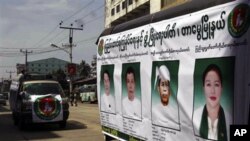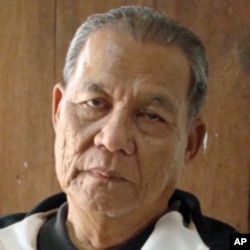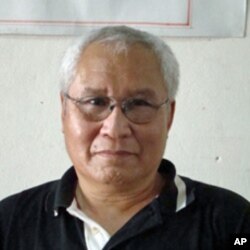Fear is rising among Burmese refugee groups living in Thailand that Burma's military is preparing to launch operations against armed ethnic groups following elections on November 7 -- a vote that refugees think will bring few benefits for Burma's minority communities.
Just talk to Reverend Robert Htway, an ethnic Karen Baptist minister at the Mae Rah Moe refugee camp in northern Thailand, and a chairman of the Karen Refugee Committee. Tens of thousands of people from Burma live in refugee camps and towns just across the border, in Thailand. And Htway expects the numbers may soon grow.
He thinks Burma's armed forces will launch operations against ethnic community militias along the border soon after the election. And, he says, the Thai government has asked refugee aid groups to prepare camps to handle any possible newcomers.
"According to insight, the military activity, they send more of the troops to the border. So they suggest... if there is fighting, many people cross to the border," Htway says. "And we also see for the Thai authority in Mae Sot, they have the meeting, so they told some of the non-government organizations we should have the place in Tak [province] area, may be three places."
He fears as many as six thousand people may be forced to flee to Thailand, adding to a refugee population of over 120,000 people.
Burma's current military leaders took power in 1988 after suppressing student protests calling for political change. Thousands are thought to have died in the crackdown on protesters, and thousands more fled the country.
For decades, the Burmese government has battled sporadically with ethnic minority groups living in border areas. The groups, some of which have well-armed militias, say they are fighting because the government failed to fulfill promises made more than 60 years ago to give them greater autonomy.
The government says it is trying to keep the groups from dividing the country.
The military says the November 7 elections -- Burma's first in 20 years -- are part of the country's transition to a civilian democracy.
But many human rights groups, Burmese democracy activists and foreign governments say the vote will only serve to keep the military in power. The constitution guarantees the military 25 percent of the seats in parliament. Because of campaign restrictions on opposition groups, army-backed parties are expected win most of the other seats.
Several ethnic communities say they expect the army to attack because the groups rejected a government call for their militias to join the national force.
The Karen National Union, Kachin Independence Army, and United Wa State Army and Shan State Army - South all face possible fighting. The groups together have some 65,000 men and women under arms.
In Thailand, Burmese activists and refugees say they expect almost all minority groups along the border to face tough times in the months after the election. Bo Kyi is a joint secretary of a support group for Burmese political prisoners.
"Internally displaced [people], that amount is not only for a few hundred - at least 500,000 people are suffering," says Kyi. "Now the military regime is trying to attack ethnic armed forces. After the election, there will be more fighting in many ethnic areas; so we really great concern for those who are living in those areas."
Despite the concerns about the election, some regional political analysts and candidates for office say the election is the first chance in years to begin political reforms in Burma.
But Karen Refugee Committee member Nya Thu Kyaw says the election offers little in the way of change.
"Nothing special [will] change that will make the people, as well as the ethnic [minorities] happy because in my opinion I think the wolf put on the sheep skin... it will remain the same as before," Kyaw says.
For many minority communities, the election is not even happening: Burma's government says security concerns forced it to cancel voting in 3,400 villages in border regions controlled by ethnic groups. That decision leaves 1.5 million people unable to vote.






